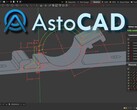East, always east - for many, many years, this has usually been true when it comes to the origin of PC hardware. Most technology products were and are produced in China at least since the 2000s. The huge workforce and lower costs made it possible for the People's Republic to take most of the worlds IT manufacturing over. Even today, in the era of re-emerging trade wars with tariffs involved, China remains the top origin for most tech products.
At the same time, outsourcing the production to a third party is another popular play for hardware manufacturing. Big PC OEMs like Dell, Apple or HP are in fact only PC designers, ODMs like Pegatron, Foxconn or Compal serve as their actual manufacturers. If you buy a laptop, desktop PC or server, it is likely that they have been made in China by one of these ODMs.
One manufacturer going against this trend is Lenovo. While Lenovo also uses the services of ODMs, the biggest PC manufacturer by volume still maintains a network of in-house factories. In this article, we explore the only European factory of Lenovo, their Budapest plant.
Lenovo Enterprise hardware for European customers comes from Budapest
In total, Lenovo owns ten factories all over the world - four in the Western hemisphere, five in Asia and only one in Europe. The lone European plant in Budapest also happens to be the newest of the bunch - construction started in 2020, the opening was in 2021.
The factory, which is located only 10 min away from Budapest Airport, serves a very specific segment: The enterprise. In Budapest, Lenovo makes three different product categories: ThinkCentre desktop PCs, ThinkStation desktop workstations and ThinkSystem servers.
Naturally, our first question was: Why these products specifically? Why not also ThinkPad laptops, which are also for the enterprise? It turns out, the biggest reason is logistics: For small products like laptops and phones, modern shipping in small packaging makes it very economically viable and sustainable to assemble the whole product in Asia and just ship it worldwide - even via air, if fast shipping is needed. The same is not true for servers and desktop, which take up way more space and which weigh more. Shipping those products is more expensive, it takes longer and is less sustainable, too.
Shipping is also the primary reason for choosing Hungary over other European countries: Hungary has a central position in Europe and the Budapest region is well-connected with the European highway network - important consideration for a factory where many trucks arrive every day to drop of parts and pick up assembled products.
To be clear: Lenovo only assembles the product in Europe. The supply chain is still world-wide, with most components naturally being made in China and the rest of Asia. The only exception to this are packaging materials and paper for manuals, as well as the locally done printing of keyboards.
Local manufacturing: Greener and faster
According to Lenovo, having the factory in Europe helps to increase the shipping speed significantly - customers in most European markets, except the UK, Ireland and Portugal, can be reached within 24 (desktops/workstations) to 72 hrs (servers).
Besides the assembly lines, Lenovo also maintains a huge testing center in Budapest, in which the servers have to endure various stress tests before they can be shipped out to the customers. Workstations and desktops of course also get their quality control, though that can look quite unorthodox from the outside: One of the standard procedures is running a game, as this is one type of application that stresses most of the system naturally.
In addition, Lenovo also refurbishes of hardware here, though this happens in a separate building to not mix new and old components. The factory uses solar power and in the winter, the outside cold is used to cool down the data center testing facility. Make no mistake: The plant, which can produce up to 1,000 servers per day and 4,000 desktops/workstations, still emits some CO2. But assembling the products locally in Europe is still more sustainable and less energy-intensive than the alternative.
According to the local Lenovo factory manager, the demand for "Made in EU for EU" is rising. While there were no concrete plans to produce laptops here as well as this point, it is something that is always evaluated on a theoretical level.
Source(s)
Own
Lenovo



















